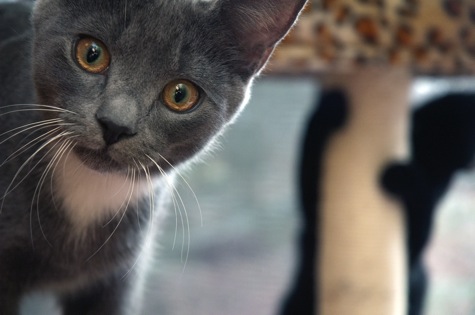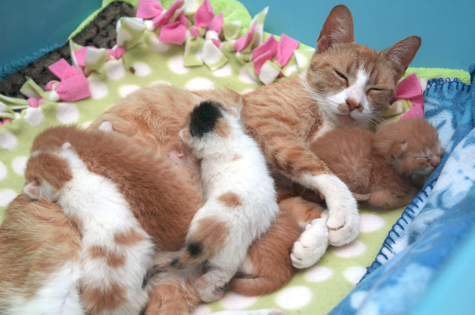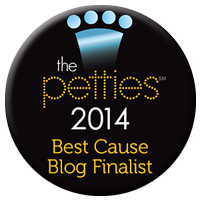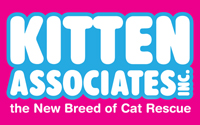
You are here
Kiss Your Kittens. Don't Kiss Your Kids!
Erin Ross, in her recent article Kitten Conundrum: Cat-Scratch Disease is Making People Sicker, suggests that if you want to stay healthy, it would be wise to “avoid kittens”, citing a recent report by the CDC about Cat Scratch Disease (CSD) or Bartonella henselae. The article warns that CSD may have the the potential for causing serious illness, particularly in children and those who are immune-compromised.
But let’s take a closer look before we start euthanizing more kittens because they won’t be getting adopted due to irresponsible fear-mongering.
While I agree it is vital to provide information to the general public regarding zoonotic disease (illness that can be transmitted between humans and animals), it is equally, if not more important, to take a common-sense approach when reading information about such findings. Yes, it’s possible in a very few cases to become very ill from CSD, but if you look at the numbers, it’s so low I have to ask myself if it's certainly worth all the fuss the press has been making about it. If you're immune compromised, of course you're at a higher risk to get ANY disease. You might not want to share your home with a pet at all, not only for the CSD risk.
Again, common sense must prevail. Wash your hands. How many times did your mom tell you to do that? If your cat or kitten nips or scratches you, WASH the wound to prevent infection. DUH. Really, people, do you have to be told this?

©2013 Robin AF Olson. Pizzelle, wondering what all the fuss is about.
I have fostered over 500 kittens in 15 years. I have NEVER gotten ANY illness from my cats or kittens. Okay, wait, I did get a spot of ringworm once. I kiss the kittens. I give them baths. They bite and scratch me, some times by accident, and some times on purpose. I’ve been to the ER once for a bad bite that was my fault. Did I get CSD? No.
What my concern for articles like the one found on NPR's web site and many others across the globe is that it can take a toll on the most innocent of creatures – kittens. It’s hard enough for shelters to find a foster home or a forever family for their most fragile residents and with this biased reporting it puts how many more lives at risk?
Kittens are euthanized every day in shelters across the country because they catch a cold or get a treatable skin condition like ringworm. Now with families afraid there’s a hidden disease in seemingly healthy kittens, that their kids are going to get sick enough to require hospitalization from being in contact with them, they're going to give up on adopting cats. Clearly there is little concern that the article could send a shock-wave of panic resulting in needless death, and cause rescues to lose foster homes and adoptions, just to make a buck on a click-bait headline.
Let’s look at some facts:
• Number of owned cats in the USA 85,800,000
• Number of people sickened by CSD per year 12,000
• Number of those people seriously sickened by CSD per year 500
• Highest average annual CSD incidence for outpatients and inpatients was among children 5–9 years of age (9.0 cases/100,000 patients and 0.4 cases/100,000 patients, respectively) …and, by the way, DOGS can also transmit CSD so maybe you better get rid of your dog, too.
What About Kids? If You Want to Get Sick, Kiss a Kid.
While everyone is panicking that little fluffy Puff is going to kill their kids from CSD, what about the other way around? Want to get SICK? BE AROUND KIDS!
This is from Pinkbook, the CDCs guide to routinely used vaccines and the diseases they prevent regarding Influenza:
"Healthy children 5 through 18 years of age are not at increased risk of complications of influenza. However, children typically have the highest attack rates during community outbreaks of influenza. They also serve as a major source of transmission of influenza within communities. Influenza has a substantial impact among school-aged children and their contacts. These impacts include school absenteeism, medical care visits, and parental work loss. Studies have documented 5 to 7 influenza-related outpatient visits per 100 children annually, and these children frequently receive antibiotics"
What Does This Mean?
9 out of 100,000 or .009% of people get sickened by CSD and 5000-7000 of 100,000 people or 5-7% get sickened by KIDS.
GETTING SICK FROM A KID IS 550 to 770 TIMES MORE LIKELY THAN GETTING SICK FROM A KITTEN.
Even the CDC study mentions its own failings:
"Our study has several limitations. First, the case definition relies on diagnosis by clinicians and subsequent coding by clinicians or billing specialists, both of which are subject to error. For example, the 078.3 code could have been inappropriately used for care of a cat scratch wound but not actual CSD. Also, in some cases, the 078.3 code may have been recorded as a rule-out diagnosis when CSD was not actually confirmed. To our knowledge, there are no data on the sensitivity and specificity of the 078.3 code for CSD."
They also state that they expected the results to be higher! So what are they telling us? Hey, maybe it’s not that bad.
"The lower incidence of inpatient admissions found by our study is surprising, given that the number of US households with cats has increased in recent decades to an all-time high of 45 million." (there are now 85.8 million “owned” cats in the USA alone)

©2013 Robin AF Olson. Minnie with her kittens and what would have become of them if they'd been in a shelter effected by a drop in adoptions and foster homes?
The last point that chaps my ass is the one that’s missing from the article. There is no mention on the toll CSD on the cats themselves. My rescue, Kitten Associates, now routinely tests for Bartonella and we DO find positive cats and kittens from time to time. We do this not only to protect our adopters, but because bartonella can mimic other illness. It might end up being overlooked while the cat ends up suffering for years, secretly sick. I’ve even randomly screened my own cats and was surprised at how many were positive, even though they were indoor-only cats and didn't have fleas. My Vet suggested that up to 20% of cats could have some level of infection (from mild, suggesting exposure but not needing treatment, to strong positive which requires treatment) and most people don’t even know it.
Ross ends the article saying not to kiss your cat until they are flea-free, which ignores the fact that if the cat has CSD, treating it for fleas is NOT going to fix the problem. You need to keep your cat INDOORS, keep him or her flea-free, test for bartonella, treat with antibiotics if there’s a strong positive, then run a titer in 6 months to make sure that cat is free from the infection. In my opinion, during the entire process you can KISS YOUR CAT all you want (I wouldn’t tongue-kiss though because that is GROSS). Let them lick your face. If they bite or scratch you, do what your mom told you to do and stop worrying about getting sick, especially if you're not immune compromised.
And get out there and adopt a kitten; better to adopt a pair. We have plenty ready to go right now!
But stay away from KIDS!
Sheesh.
©2016 Robin AF Olson. Which kitten is going to infect you with a horrible disease? Adopt one to find out. (top left: Slinky, top right: Herbie, bottom left: Aunt Bee, bottom right: Mr Peabody).


















Add new comment